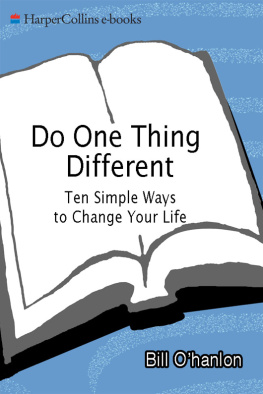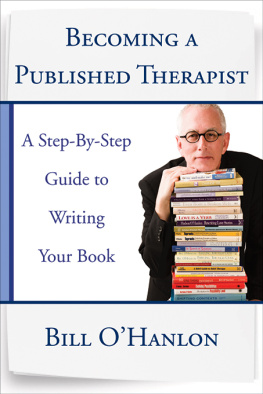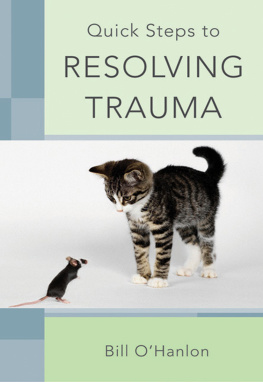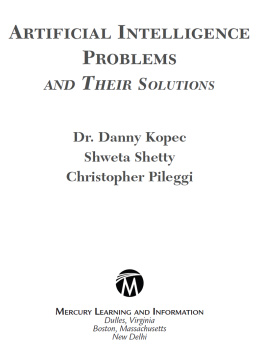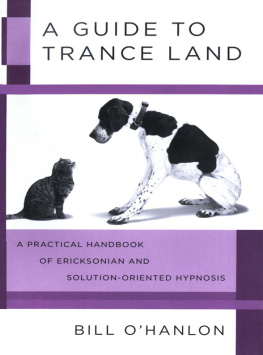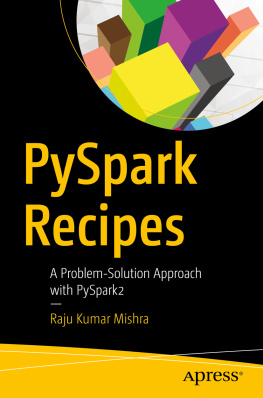
To Steffanie, who helped me get used to the dark. Once my eyes adjusted, I could see lots of possibilities.
CONTENTS
Chapter 1
Analysis Paralysis: From Liabilities to Possibilities
PART 1
CHANGING THE DOING OF THE PROBLEM: INSANITY IS DOING THE SAME THING OVER AND OVER AGAIN AND EXPECTING DIFFERENT RESULTS
Chapter 2
When Life Has Become the Same Damn Thing Over and Over Again: Changing Patterns
Chapter 3
Becoming Solution-Oriented: Doing What Works
PART 2
CHANGING THE VIEWING OF THE PROBLEM: THERES NOTHING AS DANGEROUS AS AN IDEA WHEN ITS THE ONLY ONE YOU HAVE
Chapter 4
Acknowledgment and Possibility: Getting Beyond the Past and Your Feelings
Chapter 5
What You Focus on Expands: Shifting Attention
Chapter 6
If You Dont Have a Dream, How You Gonna Make a Dream Come True? Using the Future to Solve Problems
Chapter 7
Rewriting Life Stories: Changing Problem Beliefs into Solution-Oriented Ideas
Chapter 8
Rising Above Yourself: Solution-Oriented Spirituality
PART 3
APPLYING SOLUTION-ORIENTED THERAPY TO SPECIFIC AREAS OF YOUR LIFE
Chapter 9
The Codependent Cinderella Who Loves a Man Who Hates Women Too Much: Solution-Oriented Relationships
Chapter 10
You Mean You Can Talk During This? Solution-Oriented Sexuality
Chapter 11
Exorcising the Ghosts of the Past: Using Rituals to Resolve Unfinished Business and to Prevent Problems
Chapter 12
If You Fall on Your Face, at Least Youre Heading in the Right Direction: Solution-Oriented Living
Thanks to Steffanie OHanlon, Loretta Barrett, and Darlene Hilton for comments and corrections. To Toni Sciarra for support and solid editorial guidance. To Bill Smythe for helping me to challenge insanity at the body level and to Lee Cartwright for helping me challenge insanity at the neurological level. To Annie Sprinkle, Susie Bright, Owen Morgan, and Betty Dodson, my mentors in doing one thing different in the area of sexuality. To David Whyte, for inspiration and guidance in the spiritual realm.

Socrates said the unexamined life is not worth living. But the (over)examined life makes you wish you were dead. Given the alternative, Id rather be living.
Saul Bellow
T heres an old story about a cop who comes upon a drunk crawling around talking to himself under a streetlight. The cop asks the drunk what hes doing, and the drunk answers in a slurred voice, I dropped the keys to my house. The cop helps him look around. But after fifteen minutes, when there is still no sign of the keys, the cop suggests, Lets retrace your steps. Where was the last place you remember having your keys? Oh, thats easy, replies the drunk, I dropped them across the street. You did! cries the astonished cop, Well, then why are we looking over here? Theres more light here, replies the drunk.
In a similar way, when we have a problem, we often use the light of psychology and psychiatry to look for the key to solving it. Unfortunately, they do not always provide help. Instead, they have us, like the drunk, looking in the wrong place. Explanations often give us an illusion of help by enabling us to understand why we have a problem but not giving us any concrete ways to actually solve it. These systems of explanation can lead to a victim culture, in which people focus on damage done to them in childhood or in their current relationships. This results in a tendency to blame others and look outside ourselves for solutionsto turn to experts or self-help books and groups.
Explanations are a booby prize. When youve got a problem, you want a solution. Psychological explanations, so pervasive in our society, steer people away from solving problems by giving them reasons why the problem has come about or why it is not solvable:
Jimmy has low self-esteem; thats why he is so angry.
Im so shy that Ill never meet anyone.
I was sexually abused, so my sex life is bad.
She has dyslexiathats why she cant read or write well.
One of my favorite illustrations of this problem of paralysis from overanalysis is in the movie Annie Hall. Woody Allen plays Alvey Singer, a neurotic (surprise, surprise). Soon after they meet, Alvey tells his girlfriend Annie that he has been in analysis for thirteen years. He is still clearly a mass of problems. When Annie Hall expresses amazement at how long Alvey has been in therapy without getting any better, he tells her that he knows this, that he intends to give it fifteen years, and that if he has not gotten any results by then, hes going to visit Lourdes.
Psychiatry, too, focuses on explanations, but its explanations are biological or genetic. Psychiatric theoryand theory it ismaintains that peoples problems are based on biochemistry or even determined by biochemistry or genetics. But although we are born with and influenced by genetic and biochemical factors, not everything about us is determined by these factors. Its more complicated than that. People with biochemical problems can and do have fluctuations in their functioning and sometimes recover altogether from what seems like a neurological or biochemical disorder.
The problem with psychology and psychiatry as strategies for solving problems is that:
They give you explanations instead of solutions.
They orient you toward what cant be changed: the past or personality characteristics.
They encourage you to view yourself as a victim of your childhood, your biology or genetics, your family, or societal oppression.
They sometimes create new problems you didnt know you had before you came into contact with a program or a book.
Some people with dyslexia grow up to be successful writers. Some shy people become actors or public speakers. Some abused people have fine sex lives. They havent let psychology, or ideas about what is wrong with them, dictate the course of their lives. Theyve taken a solution-oriented approach to life, focusing instead on what they can do to improve the situation.
I came to the solution-oriented approach by a very personal route. In 1971, I decided to kill myself. Now, this may seem like a strange introduction for a book designed to inspire you, but thats where it all began for me. I was very depressed and lonely at the time. I saw no possibilities for the future, aside from a continuation of the misery of the past. I considered myself a poet and certainly didnt want to work for a living. I was disillusioned by the hypocrisy I saw in society and in the people I knew. I felt as if I were all exposed nerves, as if I had no skin to protect me from the pain of the world or from contact with others. I was afraid to show my poetry to anyone but my close friends, so it wasnt likely that I would ever make a living as a poet. After a long, miserable time, Id finally decided that Id kill myself.
I was a hippie then, and the few friends I went to say good-bye to (who were generally as weird and depressed as I was) understood and accepted my decision. They would see me in another life, another trip around the wheel. It was too bad that things hadnt worked out for me in this life.
One of my friends, however, was very upset when she heard my plans for suicide. When I told her that the problem was that I just couldnt handle dealing with people and earning a living, she told me that she had some maiden aunts who would leave her some farmland in Nebraska when they died. She promised that I could live in a farmhouse on her land rent-free the rest of my life, if I would promise not to kill myself. Now,
Next page
